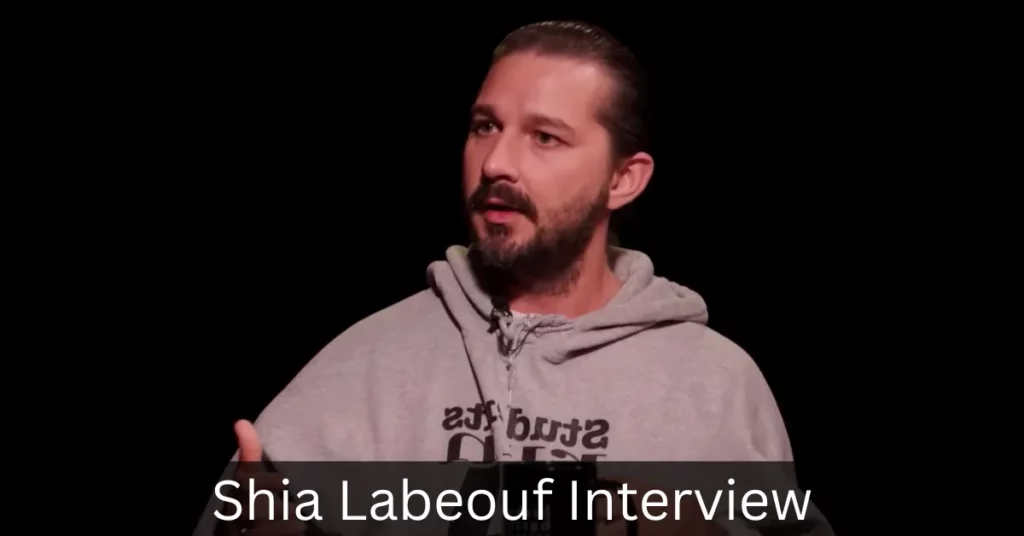Shia Labeouf Interview: Seven minutes into Shia LaBeouf and Bishop Robert Barron’s hour-and-a-half-long chat, the contentious issue of the Latin Mass is brought up. The interview is meant to be about LaBeouf’s role as the saint in the upcoming film “Padre Pio,” but the conversation quickly shifts to reveal LaBeouf’s conversion to Catholicism.
This is shown through a discussion of the role of the secret within the sacred, specifically as it relates to the differences between the ordinary and extraordinary forms of the Catholic liturgy. I can’t argue the term because I don’t know what the word means, so I’m just left with this sensation,” are LaBeouf’s words praising the Latin Mass, which he cannot grasp because he does not speak Latin.
The secondary use of incense during Mass, which Barron himself mentions, is to mask the activity at the altar. I get the need for spiritual enlightenment that drives our contemporary human tendency toward the cryptic. We’re always on display, thanks to social media’s constant monitoring and performance expectations.
With the internet at our fingertips, we can instantly access a multitude of knowledge on our phones. We could learn just about anything we set our minds to. Naturally, then, we find the unknown and the secret to be fascinating and illuminating.
However, the vastness of public information and performance made available online has exposed the seedy side of numerous establishments, from Hollywood to the church. These sentiments represent the heart of the #MeToo and Black Lives Matter campaigns. Racism, sexism, and homophobia were the prejudices covered up.
The idea that “you can’t argue the words. Thus you’re left with a feeling” necessitates correct presumptions, the lack of which can lead to cultural appropriation and manipulation. It reminds us of the importance of talking about consent. That which is said matters. That is the preferred option if a willing participant can completely understand what is being stated around them.
The native tongue should be used if the performance is set in a cultural setting best reflected in that language. Should we assume that Latin is the language spoken by the worldwide church? Is Catholicism a distinct culture?
LaBeouf also claims that he was not initially drawn to a relationship with Jesus because he had only known the “soft, fragile, all-loving, all-listening but no ferocity… meek” Jesus (Barron immediately offers the word “feminized”), and that it was not until he encountered what he considered to be “masculine” — “cape, dipped in blood, sword” — that Jesus felt “appealing” to
If the violent content of the Gospel is what draws a person to it, or if Jesus’ femininity turns them off, then we have a problem. To accept Jesus as the universal Savior, we must accept his complete, genderless divinity and boldly recognize the holiness of both the masculine and feminine in the incarnation.
Several stereotypes, including cowboys, cavemen, and gangsters, are referenced by LaBeouf throughout the discussion. In numerous passages, he thanks the male figures who “masculinized” his quest.
As for the root of this attraction to masculinity, LaBeouf reveals that he is lonely for friends and is attracted to people who treat him like a father or grandfather. The Catholic Church provides him with all of these things.
It doesn’t surprise me that the Capuchin Franciscans’ group is healing for him because I also have ties to them. One of the Capuchin monks who befriended LaBeouf while filming will preside over my wedding in a few weeks.
Make it sacred. @SlausonRec https://t.co/7CbHD2QDNY pic.twitter.com/pi5j5S7ibq
— Shia LaBeouf (@thecampaignbook) September 6, 2018
On two separate occasions, I had the pleasure of sharing a meal with Shia LaBeouf, and both my non-Catholic fiance and I felt welcomed and encouraged to talk about our unique perspectives on faith. LaBeouf admits that he came to the Capuchin table seeking “protection” and found it there.
Amid a career slump and a break with his mother, Shia LaBeouf found solace in Catholicism. For his part, LaBeouf discusses his struggles with depression and suicide ideas. After accepting Christ, he realizes God urges him to give up his desire for prominence.
The “non-transactional” connections, in which he is not required to do anything besides think about how to use his abilities for others, effectively provide him with the security he craves. It’s a lovely story about learning to let go.
It’s impossible to ignore the connection between LaBeouf’s problematic past and the worries that violence and secrecy within the Catholic Church are seductive. The claims leveled against LaBeouf over the past few years are barely mentioned by the actor, who calls them “the news.” Not once has Barron inquired. If you think this is interesting, please share it with your friends. For more updates and the latest news regarding celebrities, Visit Newswatchlist.com.
